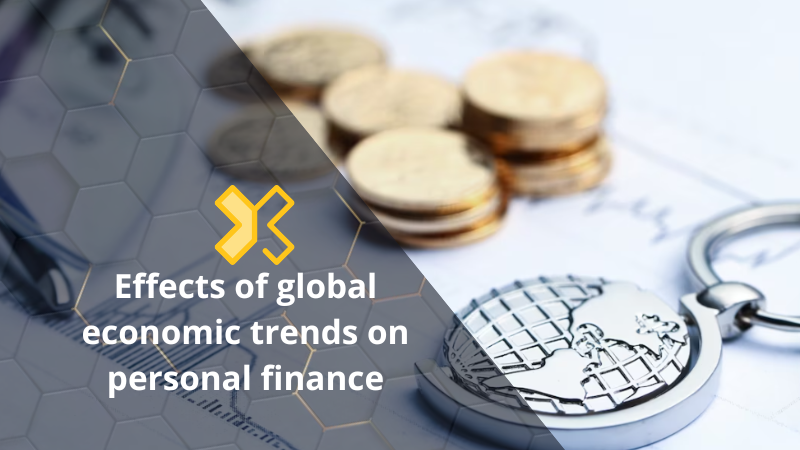
Effects of global economic trends on personal finance

Global economic trends have a significant impact on personal finance worldwide. From the influence of national economies to the effects of economic news, it is necessary to understand how these factors can affect our financial situation. Inflation and interest rates also play a crucial role in our personal finances, since they can affect our purchasing power and our options for loans and savings. Likewise, economic recessions and the COVID-19 pandemic have demonstrated their impact on our finances. Faced with these challenges, it is crucial to be prepared and understand future opportunities and risks, as well as the influence of monetary and fiscal policies on our personal finances.
- Impact of global economic trends on personal finance
- Inflation and its impact on personal finances
- Interest rates and their impact on personal finances
- Economic recession and its impact on personal finances
- The COVID-19 pandemic and its impact on personal finances
- Future opportunities and risks in personal finance globally
- Monetary and fiscal policies and their influence on personal finances
- Growth prospects in different regions of the world and their impact on personal finances
Impact of global economic trends on personal finance

Global economic trends have a significant impact on personal finance, as they are closely linked to the influence of national economies and the effects of economic news. It is essential to understand how these factors can affect our economic resources and to carry out appropriate financial management in an ever-changing global environment.
Influence of national economies on personal finance
National economies play a critical role in our personal finances. Economic indicators, such as GDP growth, the unemployment rate, and economic stability, can influence our employment opportunities, income, and spending. A strong national economy is generally correlated with greater purchasing power and greater opportunities for investment and personal financial growth.
On the other hand, national economies in recession or crisis can have a negative impact on our personal finances. The financial difficulties of companies can lead to salary reductions, mass layoffs and a lower demand for labor. In addition, during periods of economic instability, the prices of goods and services may increase, which may negatively affect our ability to save and the purchasing power of our money.
Effects of economic news on personal finances
Economic news plays an important role in our personal finances, as it provides us with information about the state of the global and national economy. News about economic indicators, monetary and fiscal policies, international events, and economic trends can affect consumer confidence, financial markets, and our individual financial decisions.
For example, high inflation announcements may cause concern among consumers, since it could mean an increase in the prices of basic products and an erosion in the purchasing power of money. Similarly, interest rate decisions made by central banks can affect interest rates on loans, mortgages, and savings accounts, influencing individuals' borrowing and saving decisions.
It is important to stay informed on economic news and seek reliable financial advice to adapt our financial strategies in response to changes in the global and national economic landscape. Only then can we make sounder financial decisions and protect our financial stability in a dynamic economic environment.
Inflation and its impact on personal finances
Inflation is an economic phenomenon that affects personal finances both nationally and globally. To understand its impact, it is necessary to understand its relationship with the economy in general.
Understanding inflation and its relationship to the global economy
Inflation refers to the sustained and general increase in the price level of goods and services in an economy. This can be caused by various factors, such as increased production costs, excessive demand, or currency devaluation.
In the global economy, inflation can have different causes and manifestations in each country. It is important to analyze economic trends on a global level to understand how it affects personal finances in different regions.
How inflation affects personal finances and purchasing power
Inflation can have a significant impact on personal finances, especially on the purchasing power of individuals. As prices increase, purchasing power decreases and more money is required to purchase the same goods and services.
This can directly affect people's budgets, as basic expenses like food, housing, and transportation become more expensive. In addition, inflation can also affect interest rates, the value of investments, and the currency exchange rate, impacting savings and long-term financial planning.
- Rising prices can compromise savings and hinder the ability to accumulate wealth.
- Debts and loans are also affected, since the real value of obligations can decrease with inflation.
- Investments may be impacted in terms of performance and profitability.
In this context, it is essential that people adopt financial protection strategies and measures to face the effects of inflation. This implies maintaining a balanced budget, diversifying investments, considering the possibility of adjusting debt levels and being attentive to opportunities that may arise in the market.
Interest rates and their impact on personal finances
Interest rates are a fundamental factor in personal finance, since they have a direct impact on loans, credits and savings. It is important to understand the importance of interest rates and their relationship to monetary policy in order to make informed financial decisions.
Importance of understanding interest rates and their relationship to monetary policy
Understanding interest rates and how they are related to monetary policy is essential for those who want to manage their personal finances effectively. Interest rates are determined by central banks and reflect the economic policies adopted to control inflation and promote economic growth.
Monetary policy aims to influence interest rates to regulate access to credit and stimulate or slow down the economy. In periods of low inflation or recessions, central banks often lower interest rates to encourage consumption and investment. On the other hand, at times of high inflation, interest rates can be increased to slow down the economy and control inflation.
It's important to be aware of changes in interest rates and understand how they can affect personal finances, both in terms of borrowing and investing. In periods of low interest rates, borrowing can become more attractive as borrowing costs are lower. However, low interest rates can also reduce returns on investments, such as time deposits or bonds.
How Interest Rates Affect Personal Loans, Credit, and Savings
Interest rates have a direct impact on personal loans and credits. When interest rates are low, home loans, personal loans, or business loans tend to have lower rates, which lowers the cost of borrowing and makes it easier to access credit. This can be beneficial for those looking to buy a home, start a business, or finance personal projects.
On the other hand, higher interest rates make borrowing more expensive, which can discourage borrowing and limit investment or spending opportunities. Interest rates also affect personal savings, as they can determine the returns on long-term savings or investment accounts. In periods of low interest rates, savings returns may be lower, which may require more diversified investment strategies to maintain asset growth.
Given these variations in interest rates, it is important to carefully evaluate loan, credit and savings options, considering the risks and benefits of each alternative. In addition, it is advisable to be informed about changes in monetary policy and the global economic outlook to make better financial decisions and protect our personal finances.
Economic recession and its impact on personal finances
The economic recession is a phenomenon that can have significant effects on personal finances. During a recession, you experience a general decline in economic activity, which can result in decreased jobs, stagnant or reduced wages, and an increased cost of living.
Consequences of an economic recession on personal finances
During an economic downturn, many people may face financial difficulties. Some of the common consequences include:
- Unemployment or reduced working hours, which can lead to decreased income and difficulties in meeting daily expenses.
- Reduced investment and economic growth, which can affect personal investment returns and growth opportunities.
- Increased inflation, which reduces purchasing power and makes it difficult to maintain the desired standard of living.
- Increased indebtedness, since many people can resort to credit to cover their basic needs during difficult times.
Strategies to Protect Personal Finances During a Recession
In the face of an economic recession, it is important to take steps to protect our personal finances and minimize the negative effects. Some strategies include:
- Create an emergency fund: Save to have a financial cushion in case of job loss or unexpected changes in income.
- Reduce or eliminate debts: Prioritize the payment of outstanding debts to avoid the accumulation of interest and additional financial pressure.
- Reassess and Adjust Expenses: Identify areas where you can cut expenses and look for ways to save in your daily budget.
- Diversify sources of income: Explore additional income opportunities, such as part-time or freelance work, to ensure a steady flow of money.
- Invest Smartly: Seek professional financial advice and consider long-term strategic investments that can offer stability and growth during difficult economic periods.
The COVID-19 pandemic and its impact on personal finances
The COVID-19 pandemic has had a significant impact on personal finances globally. This section analyzes two key aspects: financial resilience during the pandemic and the prospects for post-pandemic economic recovery.
Financial Resilience During the Pandemic: Savings and Changes in Income
During the pandemic, many people have faced drastic changes in their income. The paralysis of the economy and the restriction measures have led to business closures, layoffs and salary reductions. This has directly impacted people's ability to meet their needs and keep their personal finances stable. In this context, saving has become a crucial strategy for financial resilience. Many people have taken advantage of this situation to save more, reducing unnecessary expenses and avoiding impulse purchases.
Accumulating savings during the pandemic has allowed some people to cope with unexpected emergencies and maintain some financial stability. However, it is also important to note that not everyone has been able to save during this crisis. Those whose incomes have been severely affected have struggled to meet their basic needs and have had to dip into savings or borrow to survive. The lack of stable income has generated financial stress and increased the vulnerability of many families.
Prospects for post-pandemic economic recovery and its impact on personal finances
The post-pandemic economic recovery poses both opportunities and challenges for personal finance. As the economy begins to pick up, new job and investment opportunities may emerge. However, there are also uncertainties about what this recovery will look like and to what extent personal finances will be affected. It is important to keep in mind that the economic recovery can be slow and uneven. Some sectors may take longer to recover than others, which will directly affect jobs and income. Government policies and fiscal measures will also play a key role in the economic recovery and its impact on personal finances. In addition, it is essential to be prepared to adapt to changes that may arise in the economic landscape.
Future opportunities and risks in personal finance globally
In the global economic landscape, there are different opportunities and risks that can affect our personal finances. It is important to be aware of these factors to make informed decisions and maximize our growth potential.
Identifying investment and growth opportunities in global economies
In this age of globalization, we have access to a wide range of investment opportunities in economies around the world. Diversifying our investments internationally can be an effective strategy to mitigate risks and take advantage of potential returns in different markets. By studying and understanding economic trends in various regions, we can identify growth sectors and emerging opportunities that can benefit our personal finances.
Furthermore, it is not only about financial investments, but also about taking advantage of career growth opportunities in a global context. An increasingly connected labor market gives us the possibility to seek employment or carry out professional activities in other countries, which can generate more income and improve our financial situation.
Preparing to mitigate risks and adapt to structural challenges
Along with the opportunities, we must also consider the risks and structural challenges present in the global economy. The volatility of financial markets, changes in government policies and fluctuations in exchange rates are some of the risks that we must address. Staying informed and having an appropriate risk management strategy will help us protect our personal finances against possible setbacks.
In addition, adapting to the structural challenges that arise in the global economy is essential to stay on the path of financial growth. Factors such as digital transformation, changes in business models, and demographic trends can impact our personal finances. Being prepared to face these challenges and being flexible in our financial planning will allow us to sustain ourselves in the long term and take advantage of new opportunities that may arise.
- Analyze economic trends in different regions to identify investment opportunities.
- Diversify our investments globally to mitigate risks.
- Consider the possibility of seeking employment or carrying out professional activities in other countries.
- Keep us informed about the volatility of the financial markets and have an adequate risk management strategy.
- Adapt to the structural challenges present in the global economy, such as digital transformation and demographic trends.
Monetary and fiscal policies and their influence on personal finances
The relationship between government policies and personal finances is a fundamental issue that directly affects individuals and their economies. Decisions on monetary and fiscal policy can have a significant impact on personal finances, on the purchasing power and on the economic stability of citizens.
Understanding the relationship between government policies and personal finances
Monetary policies implemented by governments refer to the measures taken by central banks to control the money supply, regulate interest rates, and ensure economic stability. These policies can influence inflation, employment, investment and economic growth, which in turn have a direct impact on personal finances.
On the other hand, fiscal policies are related to government revenues and expenditures, including taxes and public spending. These decisions can affect people's ability to save, invest, and spend on goods and services, as well as access to financial support programs and social benefits.
How economic policy decisions impact individuals and their finances
Economic policy decisions can have various effects on personal finances. For example, a reduction in interest rates can stimulate consumption and investment, making it easier to obtain loans and reducing credit costs. This can benefit individuals looking to access financing to buy a home, start a business or make investments.
On the other hand, fiscal policies that increase taxes can reduce the disposable income of individuals, affecting their ability to save, invest, or consume. In addition, cuts in social or economic support programs can create financial hardship for those who depend on them.
It is important for individuals to understand and closely monitor monetary and fiscal policies, as well as to be informed of decisions and changes that may impact their personal finances. This will allow them to make more informed financial decisions and adapt to economic fluctuations in their environment.
Growth prospects in different regions of the world and their impact on personal finances
Growth prospects in various regions of the world play a fundamental role in the stability of personal finances. Analyzing economic trends in different countries and continents allows us to understand the potential impact they could have on our finances and make informed decisions.
Analysis of economic trends in various regions and their projection on personal finances
To assess growth prospects in different regions, it is essential to examine several key economic indicators. Some important aspects to consider are the Gross Domestic Product (GDP), the unemployment rate, political stability, inflation and deflation, as well as technological advances and the dominant economic sectors.
In Europe, a gradual increase in economic growth is expected, especially in countries like Germany, France and Spain, driven by the post-pandemic recovery and the implementation of economic stimulus policies. On the other hand, in Latin America, a slower recovery is in sight due to structural challenges, political volatility and difficulties in controlling inflation.
In Asia, countries such as China and India continue to be economic engines and are expected to maintain solid growth, offering investment opportunities. Meanwhile, in Africa, although there are challenges, there is promising economic growth, driven by infrastructure development, the rise of the middle class and the rise of the technology and service sectors.
In general, the analysis of regional economic trends gives us a clear vision of the countries that present the greatest opportunities for growth and how they can influence our personal finances. It is crucial to be aware of these changes and consider their impact when making financial decisions.
Financial preparation for economic variations and growth opportunities in different countries
Given the economic variations in different countries and regions, it is essential to be financially prepared to take advantage of opportunities and mitigate risks. Some measures that can be taken include:
- Diversify your investment portfolio: Investing in different countries and sectors can help reduce risk and take advantage of growth opportunities in different regions.
- Educate yourself on the financial laws and regulations of each country: Understanding the financial regulations of the places in which we are interested can help us make informed decisions and avoid legal conflicts.
- Seek professional advice: Having the guidance of international investment experts can be beneficial in assessing opportunities and risks in different countries and ensuring a sound financial strategy.
- Stay informed about economic and political trends: Being aware of economic, political and social developments in different regions gives us a clearer picture of possible changes in growth prospects and how they may affect our personal finances.
- Have a financial contingency plan: Having an adequate emergency fund and maintaining prudent management of our personal finances can help us face any unforeseen economic fluctuations and maintain financial stability.
If you want to know other articles similar to Effects of global economic trends on personal finance you can visit the category FINANCE.
Leave a Reply






It may interest you...